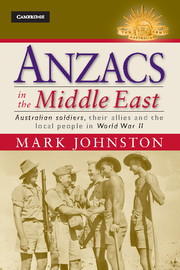Book contents
- Frontmatter
- Contents
- Photographs
- Maps
- Preface
- Acknowledgements
- Abbreviations
- Introduction
- Chapter 1 Travelling to the ‘great adventure’
- Chapter 2 ‘A different world’
- Chapter 3 ‘They're troublesome, you know’
- Chapter 4 ‘Fighting shoulder to shoulder’
- Chapter 5 ‘Australia, Australia, you are good’
- Chapter 6 ‘Unity of feeling and purpose’
- Chapter 7 ‘They treat us as a dependent nation’
- Chapter 8 ‘Gyppo Land’
- Conclusion
- Notes
- Bibliography
- Index
Chapter 6 - ‘Unity of feeling and purpose’
The siege of Tobruk
Published online by Cambridge University Press: 05 February 2013
- Frontmatter
- Contents
- Photographs
- Maps
- Preface
- Acknowledgements
- Abbreviations
- Introduction
- Chapter 1 Travelling to the ‘great adventure’
- Chapter 2 ‘A different world’
- Chapter 3 ‘They're troublesome, you know’
- Chapter 4 ‘Fighting shoulder to shoulder’
- Chapter 5 ‘Australia, Australia, you are good’
- Chapter 6 ‘Unity of feeling and purpose’
- Chapter 7 ‘They treat us as a dependent nation’
- Chapter 8 ‘Gyppo Land’
- Conclusion
- Notes
- Bibliography
- Index
Summary
When the 6th Australian Division left Libya for Greece, the danger of enemy attack seemed slight enough to justify replacing it with the untried 9th Division, which was neither fully equipped nor fully trained. However, German forces began arriving at Tripoli in February and were soon patrolling aggressively. While these preliminaries to battle occurred, the newly arrived Australians were infuriating allies and the locals behind the lines. Tim Fearnside tells of an incident that followed the long-awaited arrival of Bren light machine-guns at the 2/13th Battalion. Two ‘wild colonial boys’ stationed in Barce took their gun to the outskirts of the town and began some target practice. Fearnside said that they thought the tower at which they aimed was out of range, but an irate deputation of Arabs showed that they had been wrong: the bullets had hit and damaged the minaret of a mosque. This is a tantalisingly core indicator of how Libyans felt about Australians.
Australians at Barce had also angered senior British officers in Cyrenaica, and in particular their commander, Lieutenant-General Sir Philip Neame, VC. He became so incensed at the misbehaviour of Australians in Libyan towns that on 31 March he wrote a strong letter to the 9th Division's recently appointed commander, Major-General Leslie Morshead. The numerous ‘disgraceful incidents’ he brought to Morshead's attention included ‘drunkenness, resisting military police, shooting in the streets, breaking into officers’ messes and threatening and shooting at officers’ mess servants, even a drunken Australian soldier has come into my own headquarters and disturbed my staff’. He told of inebriated soldiers accosting him and the visiting Commander-in-Chief and Chief of the Imperial General Staff. He concluded by warning Morshead that ‘your Division will never be a useful instrument of war unless and until you can enforce discipline’. As disciplining an Australian unit was not in his jurisdiction, he said he was holding Morshead responsible for the division's behaviour; if there was no improvement he would report Morshead to General Blamey. Barton Maughan, the Australian official historian of Tobruk and Alamein, says, perhaps rather glibly, that ‘some censure’ may have been deserved on this occasion but that ‘it was a lapse from a high standard previously set and afterwards maintained’. Brigadier Bidwell, who wrote an authoritative post-war history of the British artillery, offers some support here.
- Type
- Chapter
- Information
- Anzacs in the Middle EastAustralian Soldiers, their Allies and the Local People in World War II, pp. 111 - 140Publisher: Cambridge University PressPrint publication year: 2012



